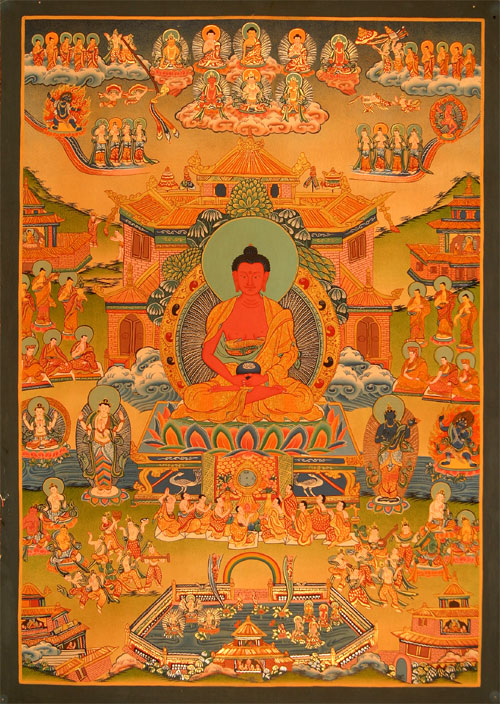 (Shouldn’t Pure Land Practitioners Practise Beyond Mindfulness of Buddha?)
(Shouldn’t Pure Land Practitioners Practise Beyond Mindfulness of Buddha?)
Question: On the answers given at Should Purelanders Just Practise Buddha Mindfulness?, they seem to contradict the general view that the more Dharma study (learning), contemplation and practice (including meditation) [闻思修] there is, the better it is?
Answer: Yes, the more there is of Dharma study, contemplation and practice, the better it is – generally; not specifically – as exemplified in the article, on a case-by-case basis. As the key objective of Pure Land practitioners is to ensure there is successful birth in Pure Land, it is important to note the bare minimum requirements, but while doing as much as we can.
Q: On point 7 in the article, are the merits created via being mindful of the Amituofo similar to those accumulated via the Three Acts of Merit? Can doing the former substitute the need to engage in the latter?
A: Actually, the bare minimum mentioned above does includes merits too. It is worth noting, that whether they are created abundantly via the Three Acts or not, it is actually Amituofo’s merits that does most of the work as other-power – which enables birth in Pure Land. Our merits acquired by self-power alone are never enough to karmically deserve birth in Pure Land. This is a reason why Faith and Aspiration to connect to Amituofo is very important.
On point 7, it is best to create more merits, via both the Three Acts of Merits along with the core Practice of mindfulness of Buddha. As to whether merits accumulated via the two means are similar, it all depends on the quality of the purity of the mind of the practitioner – which affects the quality and quantity of the merits. Most are unable to hold a similar mind states when practising the duo. The resulting merits thus differ.
It is also hard to quantify how much Practice of mindfulness of Buddha is equivalent to how much of the Three Acts in terms of merits. The Three Acts of Merit alone cannot lead to Pure Land – if they do not in essence complete the Three Provisions in practice. Mindfulness of Buddha done well (which includes all Three Provisions) is very meritorious. But if it is done only to accumulate merits, the Three Provisions would still be incomplete [as there might be no Aspiration (to use the merits) for birth in Pure Land].
If Person A practises mindfulness of Buddha very well, but doesn’t focus on doing the Three Acts of Merit fully, the merits accumulated might still be enough for successful birth in Pure Land (because mindfulness of Buddha is meritorious too). If Person B does the Three Acts of Merit very well, but doesn’t focus on mindfulness of Buddha, the chances of a successful birth are lower – because the core Practice (which embodies all Three Provisions) is not done well. Mindfulness of Buddha can substitute the Three Acts of Merit as a means to accumulate merits only when it is done very well in itself – such that the stocking up of merits via other means becomes less essential. Mindfulness of Buddha can substitute the Three Acts, but the Three Acts cannot substitute mindfulness of Buddha as the core Practice. (This is, unless we interpret the Three Acts differently – as below.)
Usually, those who substitute the Three Acts with just mindfulness of Buddha are those with severe inabilities to practise the Three Acts (e.g. the handicapped or very sick). It is not that they do not wish to practise the Three Acts; but that they cannot do them well. If not, it is quite natural for those who practise mindfulness of Buddha well to do the Three Acts too. It is also possible that one who does not seem to do much of the Three Acts, who nevertheless is able to be born in Pure Land, could had already done much of them in a previous life already. There are adequate merits, though it might not appear so at first.
Worth noting too is that the Three Acts are not just guidelines on what those who aspire for birth in Pure Land should do as much as possible. They are also precept-like guidelines on what they should not do. As an example, the guideline at Three Acts of Merit (True Causes for Pure Karma) on ‘compassionately refraining from killing’ (慈心不杀) reminds us not to do any killing – because to do so creates immense ‘demerits’ instead – which renders one further away from the possibility of birth in Pureland.
When the Three Acts are interpreted in a more detailed way, the Three Provisions are in them too. E.g. part of ‘[reading and] chanting the Mahayana Sutras’ (读诵大乘) would include the cultivation of Faith in the Pureland teachings. Part of the ‘encouraged’ (劝) in ‘encouraging people to follow their teachings’ (劝进行者) would include the encouragement or cultivation of Aspiration in others (which would naturally include ourselves first) to practise the teachings, which include the Pureland ones. Part of the ‘followed’ (行) in the same words (劝进行者) would include following of the (core) Practice itself. This further exemplifies what was mentioned earlier, of how sets of Dharma teachings are intertwined. Here, the Three Acts are closely interlinked with the Three Provisions.
In a way, just practising the core Practice of mindfulness of Buddha (by chanting) is alright, provided that the Three Provisions are adequate, and are embedded or increased within the chanting itself. Actually, the Three Acts are interconnected to the chanting. For example, part of the Three Acts is filial piety. It is impossible to keep chanting well and yet not increase in filial piety, because Right Mindfulness of Buddha will tune us towards the Three Acts. In this sense, the core Practice of chanting and the Practice of the Three Acts are not mutually exclusive – though for convenience, we say mindfulness of Buddha is the core Practice. It is however, still important to emphasise what the core Practice is – because the Pure Land method is meant to be relatively simpler – to benefit more people. If it is taught to require a lot of other practices, this would defeat its original purpose of providing an efficient way to exit Samsara.
The greater the Three Provisions, along with Compassion, Wisdom, Aspiration (the ultimate being based on Bodhicitta) and Practice (in general; including and beyond those outlined in the Three Acts of Merit), the higher the grade of birth one will attain in Pure Land. Compassion, Wisdom, Aspiration and Practice, being the cardinal virtues of all Bodhisattvas to be perfected, can be increased by study, contemplation and practice too.




